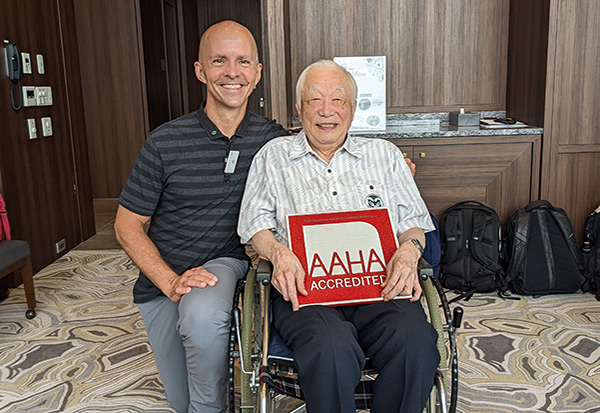AAHA expands international accreditation into Asia
Updated September 26, 2023
Dr. Gen Kato, owner of the Daktari Animal Hospital Tokyo Medical Center, had what some at the time might have considered a lofty goal: Become accredited by the American Animal Hospital Association (AAHA). But in 2022, thanks to his similar philosophical vision and desire to bring these rigorous accreditation standards to Japan—and after two-and-a-half years—Daktari Animal Hospital became the first internationally AAHA-accredited animal hospital.
The hospital, which has three facilities in Tokyo and numerous affiliate locations throughout Japan, offers a variety of services, from wellness and preventative care to 24-hour emergency and critical care to cancer treatments.
“I feel a sense of destiny that my hospital, which has such a close connection with AAHA, has become the first AAHA-accredited hospital outside of the United States and Canada,” Dr. Kato told AVMA News. “AAHA standards are the best system for hospitals to provide basic and advanced veterinary care.”
Garth Jordan, AAHA CEO, explained that Daktari Animal Hospital was a “really good exemplar” of what it means to start to scale the accreditation process internationally. Following in Dr. Kato’s footsteps, five institutions in Japan were accredited this summer after completing training and certification from AAHA’s staff members. They are as follows:
- Nihon University
- Daktari Kansai Medical Center
- Daktari Shinagawa Wellness Center
- Jasmine ARH
- All Heart ARC
More recently, on August 22, AAHA announced a partnership with the Korean VMA (KVMA) to bring accreditation to South Korean veterinary practices. The association has already identified three practices to work with.
Around 3.12 million households in South Korea have animal companions and the country has approximately 5,500 small animal veterinary clinics, according to data from Statistics Korea.
Expanding internationally
AAHA-accredited hospitals must regularly pass onsite evaluations based on more than 900 standards of veterinary care. An AAHA accreditation signifies that a veterinary practice has met or exceeded stringent standards that encompass all aspects of veterinary medicine, from pain management to medical record-keeping, and has committed to a path of continuous improvement.
AAHA is not expanding its accreditation program internationally for the sake of growth, Jordan said, but rather, “we’re doing it for the sake of helping bring the right standards into a country that is ready, willing, and able to bring the concepts of standards and accreditation into their country.”
Before that could happen, however, AAHA first had to have infrastructure in place to enable the process to happen in another country.
There are three main steps to the international accreditation process. The first is to translate the standards from English into another language. Next, some of the standards must be customized for the legal and cultural aspects of the country. For example, childproof prescription bottles are not the norm in Japan, so this wasn’t required for accreditation. Lastly, an agreement is made with the partner to establish agents to perform accreditation evaluations on behalf of AAHA.
AAHA representatives trained Japan-based veterinary professionals to become AAHA practice consultants who help with site visits and support accreditation efforts. Because these consultants are embedded in the Japanese veterinarian profession, they help AAHA create awareness about what the standards are, what accreditation looks like, and what it means.
As with typical AAHA accreditations, a large portion of the evaluation is performed onsite. An AAHA leadership team visited Daktari Animal Hospital last year to conduct the assessment.
Once a practice is accredited, AAHA provides ongoing support and recommendations for maintaining and exceeding the standards of care established. For international practices, this is especially important as they may be among the first accredited in their regions and can benefit from connections with other organizations that follow the same standards.
“I think it is wonderful to be able to connect with people around the world who are in the same boat of veterinary medicine,” Dr. Kato said.
A newly revised mission
This new endeavor stems from AAHA’s latest strategic planning process, which resulted in a new mission statement: Simplify the journey towards excellence for veterinary practices.
AAHA seeks to support practices in whatever way it can, and it doesn’t have to include accreditation, Jordan said. The association focuses on being open and supportive to any individual country and collective veterinary ecosystems’ journey to excellence.
He explained that AAHA learned one way to support different countries is to not think of accreditation as a “yes or no” situation but more like tiers or stages.
“We might need to be flexible with what accreditation means in different countries, so we’re not trying to write a one-size-fits-all concept,” Jordan said.
When selecting countries to partner with in the future, AAHA is methodical and purposeful in evaluating if they are philosophically aligned and desire support.
Jordan anticipates the development of a common database of AAHA-accredited practices. This combination of data and standard operating procedures will lend itself to valuable research, tying it to outcomes to help unify practices.
“My hope is we are building something that is stable and can be repeated, with the assumption this will grow,” Jordan said.
Dr. Kato remains happy with the decision to have his clinic become AAHA accredited, which he says creates opportunities for clients to learn about the high quality of veterinary care his staff members provide.
“We also believe that AAHA-accredited hospitals can make a significant contribution to the development of veterinary medicine,” Dr. Kato said. “The more hospitals that become accredited, the more progress will be made in veterinary medicine, which can only be good for those of us involved in veterinary medicine, our patients, and their owners.”
A version of this story appears in the November 2023 print issue of JAVMA




